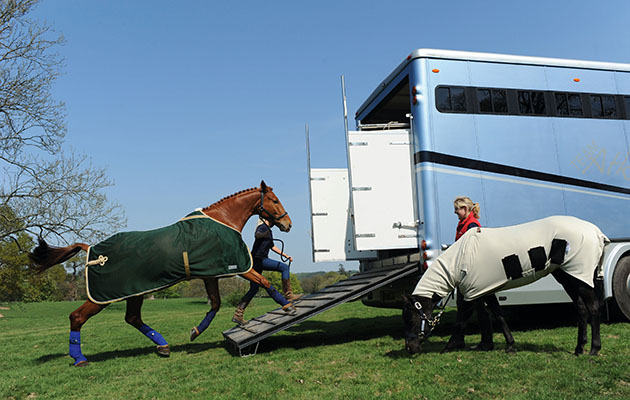URGENT questions have been raised over the reality of post-Brexit international horse transport as the 1 January deadline looms.
Crucial ends are still to be tied up as horse owners, riders, businesses and transporters seek to understand which hoops they are required to jump through to move horses from Britain to the EU or Republic of Ireland in seven weeks’ time.
{"content":"PHA+VGhlIE5hdGlvbmFsIEF1ZGl0IE9mZmljZeKAmXMgcmVwb3J0IG9uIHRoZSBVSyBib3JkZXLigJlzIHByZXBhcmVkbmVzcyBmb3IgdGhlIDMxIERlY2VtYmVyIGVuZCBvZiB0aGUgQnJleGl0IHRyYW5zaXRpb24gcGVyaW9kLCBwdWJsaXNoZWQgNiBOb3ZlbWJlciwgd2FybmVkIHRoZXJlIGlzIOKAnGxpa2VseSB0byBiZSBzaWduaWZpY2FudCBkaXNydXB0aW9uIGF0IHRoZSBib3JkZXIgZnJvbSAxIEphbnVhcnnigJ0uPC9wPgo8cD5UaGUgd2F0Y2hkb2cgYWRkcyB0aGF0IGFsdGhvdWdoIEdvdmVybm1lbnQgZGVwYXJ0bWVudHMgaGF2ZSBtYWRlIHByb2dyZXNzIGFuZCBhIHNpZ25pZmljYW50IGFtb3VudCBvZiBtb25leSBpcyBiZWluZyBzcGVudCwgdGltZSBpcyBydW5uaW5nIG91dC4gSXQgc3RhdGVzIHRoYXQgZXZlbiBpZiBHb3Zlcm5tZW50IG1ha2VzIGZ1cnRoZXIgcHJvZ3Jlc3Mgd2l0aCBpdHMgcHJlcGFyYXRpb25zLCB0aGVyZSBpcyBzdGlsbCBsaWtlbHkgdG8gYmUgc2lnbmlmaWNhbnQgZGlzcnVwdGlvbiBhdCB0aGUgYm9yZGVyLjwvcD4KPHA+QSA8YSBocmVmPSJodHRwczovL3d3dy5ob3JzZWFuZGhvdW5kLmNvLnVrL3RhZy9kZWZyYSI+RGVmcmE8L2E+IHdlYmluYXIgb24gNCBOb3ZlbWJlciBleHBsYWluZWQgaW4gZGV0YWlsIHRoZSBzdGVwcyBhbnlvbmUgdGFraW5nIGhvcnNlcyBmcm9tIEJyaXRhaW4gdG8gRVUgbWVtYmVyIHN0YXRlcyB3aWxsIG5lZWQgdG8gZm9sbG93IGFmdGVyIHRoZSBlbmQgb2YgdGhlIHRyYW5zaXRpb24gcGVyaW9kLiBXaGlsZSBpdCBhbnN3ZXJlZCBtYW55IHF1ZXJpZXMsIHF1ZXN0aW9ucyByZW1haW4gb3ZlciBzb21lIGxvZ2lzdGljYWwgcG9pbnRzLCBhbmQgVUsgc3R1ZGJvb2tzIOKAkyBpbmNsdWRpbmcgV2VhdGhlcmJ5cyDigJMgYXJlIHN0aWxsIGF3YWl0aW5nIEVVIHJlY29nbml0aW9uIHRoYXQgd291bGQgbWVhbiBob3JzZXMgb24gdGhlaXIgYm9va3MgYXJlIGNvbnNpZGVyZWQg4oCccmVnaXN0ZXJlZOKAnS48L3A+CjxwPjxkaXYgY2xhc3M9ImFkLWNvbnRhaW5lciBhZC1jb250YWluZXItLW1vYmlsZSI+PGRpdiBpZD0icG9zdC1pbmxpbmUtMiIgY2xhc3M9ImlwYy1hZHZlcnQiPjwvZGl2PjwvZGl2PjxzZWN0aW9uIGlkPSJlbWJlZF9jb2RlLTMxIiBjbGFzcz0iaGlkZGVuLW1kIGhpZGRlbi1sZyBzLWNvbnRhaW5lciBzdGlja3ktYW5jaG9yIGhpZGUtd2lkZ2V0LXRpdGxlIHdpZGdldF9lbWJlZF9jb2RlIHByZW1pdW1faW5saW5lXzIiPjxzZWN0aW9uIGNsYXNzPSJzLWNvbnRhaW5lciBsaXN0aW5nLS1zaW5nbGUgbGlzdGluZy0tc2luZ2xlLXNoYXJldGhyb3VnaCBpbWFnZS1hc3BlY3QtbGFuZHNjYXBlIGRlZmF1bHQgc2hhcmV0aHJvdWdoLWFkIHNoYXJldGhyb3VnaC1hZC1oaWRkZW4iPg0KICA8ZGl2IGNsYXNzPSJzLWNvbnRhaW5lcl9faW5uZXIiPg0KICAgIDx1bD4NCiAgICAgIDxsaSBpZD0ibmF0aXZlLWNvbnRlbnQtbW9iaWxlIiBjbGFzcz0ibGlzdGluZy1pdGVtIj4NCiAgICAgIDwvbGk+DQogICAgPC91bD4NCiAgPC9kaXY+DQo8L3NlY3Rpb24+PC9zZWN0aW9uPjwvcD4KPHA+VGhpcyBpcyBjcnVjaWFsIGFzIHRoZXJlIGFyZSBhZGRpdGlvbmFsIHN0ZXBzIGFuZCBkb2N1bWVudGF0aW9uIHJlcXVpcmVkIGZvciDigJx1bnJlZ2lzdGVyZWTigJ0gaG9yc2VzIHRyYXZlbGxpbmcgZnJvbSB0aGUgVUsgdG8gdGhlIEVVLjwvcD4KPHA+RGVmcmEgaXMgYWR2aXNpbmcgYW55b25lIGludm9sdmVkIGluIHRyYW5zcG9ydGluZyBob3JzZXMgZnJvbSB0aGUgVUsgdG8gdGhlIEVVIHRvIOKAnHBsYW4gYW55IGV4cG9ydHMgb24gdGhlIGJhc2lzIHRoYXQgdGhlIFVL4oCZcyBzdHVkYm9va3Mgd2lsbCBub3QgYmUgcmVjb2duaXNlZCBmcm9tIDEgSmFudWFyeeKAnS48L3A+CjxwPk9ubHkgaW50ZXJuYXRpb25hbCBzcG9ydCBob3JzZXMgdGhhdCBoYXZlIGFuIEZFSSB3cmFwIG9uIHRoZWlyIHBhc3Nwb3J0IGFuZCB0aG9zZSByZWdpc3RlcmVkIHdpdGggdGhlIEh1cmxpbmdoYW0gUG9sbyBBc3NvY2lhdGlvbiBhcmUgY29uc2lkZXJlZCDigJxyZWdpc3RlcmVk4oCdLiBBcyB0aGUgQnJpdGlzaCBIb3JzZXJhY2luZyBBdXRob3JpdHkgZG9lcyBub3QgbWFuYWdlIGludGVybmF0aW9uYWwgY29tcGV0aXRpb25zLCB0aGlzIHBhcnRpY3VsYXIgcm91dGUgaXMgbm90IGFuIG9wdGlvbiBmb3IgQnJpdGlzaCByYWNlaG9yc2VzLjwvcD4KPGRpdiBjbGFzcz0iYWQtY29udGFpbmVyIGFkLWNvbnRhaW5lci0tbW9iaWxlIj48ZGl2IGlkPSJwb3N0LWlubGluZS0zIiBjbGFzcz0iaXBjLWFkdmVydCI+PC9kaXY+PC9kaXY+CjxwPkNvbmNlcm5zIHdlcmUgcmFpc2VkIGR1cmluZyB0aGUgUSZhbXA7QSBzZXNzaW9uIG92ZXIgYWRkaXRpb25hbCByZXF1aXJlbWVudHMgVUsgdHJhbnNwb3J0ZXJzIHdpbGwgYmUgcmVxdWlyZWQgdG8gaGF2ZSB3aGVuIG9wZXJhdGluZyBpbiB0aGUgRVUsIHdoZXRoZXIgaXQgd291bGQgYmUgcG9zc2libGUgZm9yIHRoZXNlIHRvIGJlIGluIHBsYWNlIGJ5IDEgSmFudWFyeSBhbmQgaWYgbm90LCB3aGV0aGVyIHRoaXMgd291bGQgZ2l2ZSBFVSBjb21wYW5pZXMgYSBidXNpbmVzcyBhZHZhbnRhZ2UuPC9wPgo8cD7igJxHb2luZyBmb3J3YXJkLCBpbiBvcmRlciB0byB0cmFuc3BvcnQgaG9yc2VzIGludG8gdGhlIEVVIFtvbiBhIGNvbW1lcmNpYWwgYmFzaXNdLCB5b3Ugd2lsbCBiZSByZXF1aXJlZCB0byBob2xkIEVVIGNlcnRpZmljYXRlcyBvZiBjb21wZXRlbmNlIGFuZCBFVSB2ZWhpY2xlIGFwcHJvdmFsIGNlcnRpZmljYXRlcyzigJ0gc2FpZCBSYWNoYWVsIEJydW5za2lsbCwgRGVmcmHigJlzIGFuaW1hbCB3ZWxmYXJlIGR1cmluZyB0cmFuc3BvcnQgcG9saWN5IGxlYWQuPC9wPgo8ZGl2IGNsYXNzPSJhZC1jb250YWluZXIgYWQtY29udGFpbmVyLS1tb2JpbGUiPjxkaXYgaWQ9InBvc3QtaW5saW5lLTQiIGNsYXNzPSJpcGMtYWR2ZXJ0Ij48L2Rpdj48L2Rpdj4KPHA+4oCcRVUgY2VydGlmaWNhdGVzIG9mIGNvbXBldGVuY2UgY2FuIGJlIGFwcGxpZWQgZm9yIGluIG1vcmUgdGhhbiBvbmUgbWVtYmVyIHN0YXRlLCBzbyB5b3Ugc2hvdWxkIGJlIGVsaWdpYmxlIHRvIGRvIHRoYXQgZnJvbSBub3cs4oCdIHNoZSBzYWlkLCBhZGRpbmcgdGhhdCB2ZWhpY2xlIGFwcHJvdmFsIGNlcnRpZmljYXRlcyBjYW5ub3QgYmUgaXNzdWVkIHVudGlsIHRoZSBVSyBoYXMgbGVmdCwgb24gMSBKYW51YXJ5LjwvcD4KPHA+U2hlIGFkZGVkIOKAnHRoZXJlIHdpbGwgYmUgbm8gY29tbWVyY2lhbCBkaXNhZHZhbnRhZ2UgdG8gQnJpdGlzaCB0cmFuc3BvcnRlcnPigJ0uPC9wPgo8ZGl2IGNsYXNzPSJhZC1jb250YWluZXIgYWQtY29udGFpbmVyLS1tb2JpbGUiPjxkaXYgaWQ9InBvc3QtaW5saW5lLTUiIGNsYXNzPSJpcGMtYWR2ZXJ0Ij48L2Rpdj48L2Rpdj4KPHA+4oCcRVUgdHJhbnNwb3J0ZXJzIHdpbGwgYmUgcmVxdWlyZWQgdG8gYXBwbHkgdG8gdGhlIFVLIGF1dGhvcml0aWVzIGZvciB2ZWhpY2xlIGFwcHJvdmFsIGNlcnRpZmljYXRlcywgY2VydGlmaWNhdGVzIG9mIGNvbXBldGVuY2UgYW5kIHRyYW5zcG9ydGVyIGF1dGhvcmlzYXRpb25zLCBpbmNsdWRpbmcgdGhlIGpvdXJuZXkgbG9ncywgaW4gdGhlIHNhbWUgd2F5IG91ciB0cmFuc3BvcnRlcnMgd2lsbCBoYXZlIHRvIGFwcGx5IHRvIHRoZSBFVSwgc28gd2UgYXJlIGNyZWF0aW5nIGEgbGV2ZWwgcGxheWluZyBmaWVsZCBhbmQgbm90IGNyZWF0aW5nIGFuIGFkdmFudGFnZSBmb3IgRVUgdHJhbnNwb3J0ZXJzLOKAnSBzaGUgc2FpZC48L3A+CjxwPlRoZSB3ZWJpbmFyIHdhcyBhc3N1cmVkIHRoYXQgdGhlIGZpcnN0IGJvcmRlciBjb250cm9sIHBvc3QgKEJDUCkgZm9yIHJlZ2lzdGVyZWQgYW5kIHVucmVnaXN0ZXJlZCBlcXVpbmVzIGVudGVyaW5nIHRoZSBFVSBhdCBDYWxhaXMg4oCcd291bGQgYmUgcmVhZHnigJ0gaW4gdGltZS4gQXBwb2ludG1lbnRzIHdpbGwgYmUgcmVxdWlyZWQgYXQgdGhlIENhbGFpcyBCQ1AsIHdoaWNoIGxlZCB0byBmdXJ0aGVyIHF1ZXJpZXMgb3ZlciBob3cgbXVjaCBub3RpY2UgaXMgbmVlZGVkLCB3aGV0aGVyIGFwcG9pbnRtZW50cyBhcmUgcGVyIHZlaGljbGUgb3IgcGVyIGhvcnNlLCBhbmQgd2hldGhlciB0aGUgYm9yZGVyIHdpbGwgYmUgb3BlbiAyNCBob3VycyBhIGRheS48L3A+CjxwPk93bmVycy90cmFuc3BvcnRlcnMgd2VyZSBhZHZpc2VkIHRvIGNoZWNrIHdpdGggQ2FsYWlzIGluIGFkdmFuY2UuPC9wPgo8cD5UaGUgbG9naXN0aWNzIG9mIGhhdmluZyBhbiBhcHByb3ByaWF0ZSB2ZXTigJlzIHNpZ25hdHVyZSDigJxvbiB0aGUgZGF5IG9mIGRlcGFydHVyZeKAnSBvbiB0aGUgbmVjZXNzYXJ5IHBhcGVyd29yayBmb3IgdW5yZWdpc3RlcmVkIGhvcnNlcyAoZm9yIHJlZ2lzdGVyZWQgaG9yc2VzIHRoaXMgY2FuIGJlIGRvbmUgdGhlIHByZXZpb3VzIHdvcmtpbmcgZGF5KSB3YXMgYWxzbyBxdWVzdGlvbmVkLCB3aXRoIG9uZSBwZXJzb24gcXVlcnlpbmcgaG93IHRoYXQgd291bGQgd29yayBmb3IgYSAzYW0gZGVwYXJ0dXJlIHRpbWUsIGZvciBleGFtcGxlLiBPdGhlciBxdWVzdGlvbnMgYXdhaXRpbmcgY2xhcml0eSBpbmNsdWRlIHF1ZXJpZXMgb3ZlciBleHBvcnQgaGVhbHRoIGNlcnRpZmljYXRlcyAoRUhDcykgZm9yIGhvcnNlc+KAmSByZXR1cm4gam91cm5leXMgYXMgd2VsbCBhcyB3aGF0IHdpbGwgaGFwcGVuIGlmIGEgaG9yc2UgaXMgcmVqZWN0ZWQgYXQgYSBCQ1AuPC9wPgo8cD7igJxUaGUgaW1tZWRpYXRlIGFuc3dlciBpcyBpdCBkZXBlbmRzIG9uIHdoaWNoIGJhc2lzIHRoZSBjb25zaWdubWVudCBpcyByZWplY3RlZCzigJ0gc2FpZCBEZWZyYSBlcXVpbmUgcG9saWN5IGxlYWQgU2ltb24gV2F0ZXJmaWVsZCwgYWRkaW5nIHRoZXJlIGFyZSBhbmltYWwgd2VsZmFyZSBjb25zaWRlcmF0aW9ucyBpbnZvbHZlZCBhbmQgaGUg4oCcd291bGRu4oCZdCB3YW50IHBlb3BsZSB0byBhc3N1bWUgdGhlIGZpcnN0IGludGVudGlvbiBpcyB0byB0dXJuIHRoZW0gcm91bmTigJ0uPC9wPgo8ZGl2IGNsYXNzPSJpbmplY3Rpb24iPjwvZGl2Pgo8cD7igJxJZiBpdCBpcyBqdXN0IHRoYXQgdGhlIGhvcnNlIGRvZXNu4oCZdCBoYXZlIHRoZSBhcHByb3ByaWF0ZSBkb2N1bWVudGF0aW9uLCB3ZSBleHBlY3QgdGhlIEJDUCB0byBsaWFpc2Ugd2l0aCBpbXBvcnRlci9leHBvcnRlciB0byBtYWtlIHN1cmUgdGhlIGRvY3VtZW50YXRpb24gaXMgb2J0YWluZWQgYW5kIHRoZXJlZm9yZSB0aGUgYW5pbWFscyB3aWxsIGJlIGFsbG93ZWQgdG8gYmUgcmVsZWFzZWQgYW5kIGNhbiBjb250aW51ZS4gVHVybmluZyB0aGUgYW5pbWFscyByb3VuZCBpcyBub3Qgc29tZXRoaW5nIHRoYXQgdGhlIEJDUHMgd2lsbCBkbyBhdXRvbWF0aWNhbGx5LiBJZiB0aGVyZSB3ZXJlIGEgZGlzZWFzZSByaXNrIG9yIHNvbWV0aGluZyBzZXJpb3VzLCB0aGVuIHRoZSBjaGFuY2VzIGFyZSB0aGV5IHdvdWxkIGhhdmUgdG8gcmV0dXJuLuKAnTwvcD4KPHA+Rm9yIG1vcmUgaW5mb3JtYXRpb24sIHZpc2l0IDxhIGhyZWY9Imh0dHBzOi8vd3d3Lmdvdi51ay9ndWlkYW5jZS9leHBvcnQtaG9yc2VzLWFuZC1wb25pZXMtZnJvbS0xLWphbnVhcnktMjAyMSIgdGFyZ2V0PSJfYmxhbmsiIHJlbD0ibm9vcGVuZXIgbm9yZWZlcnJlciI+PHN0cm9uZz50aGUgZ292ZXJubWVudCB3ZWJzaXRlLjwvc3Ryb25nPjwvYT48L3A+CjxwPgo="}
You might also be interested in…
Horse & Hound explains what preparations are needed to travel horses to Holland
Library image.
Credit: www.timeincukcontent.com
A ‘digital passport’ for horses has been put forward as a solution to help smooth cross-border travel continue for competition,
A step forward has been taken to help secure the seamless travel of horses between Britain and EU member states
Stay in touch with all the news in the run-up to and throughout the major shows and events during 2025 and beyond with a Horse & Hound subscription. Subscribe today for all you need to know ahead of these major events, plus online reports on the action as it happens from our expert team of reporters and in-depth analysis in our special commemorative magazines. Have a subscription already? Set up your unlimited website access now
H&H senior news writer
Lucy is an experienced news journalist, reporter and presenter. Since joining the Horse & Hound team in 2015, Lucy has reported from major global sporting events including the Tokyo Paralympic Games and multiple European Championships, as well as Badminton, Burghley and London, to name a few. She has covered current affairs and sports news across the full spectrum of equestrian disciplines and racing, as well as human and equine welfare, industry news and court cases.





